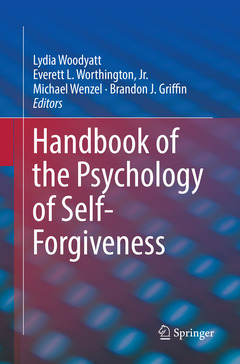Handbook of the Psychology of Self-Forgiveness, Softcover reprint of the original 1st ed. 2017
Coordonnateurs : Woodyatt Lydia, Worthington, Jr. Everett L., Wenzel Michael, Griffin Brandon J.

The present volume is a ground-breaking and agenda-setting investigation of the psychology of self-forgiveness. It brings together the work of expert clinicians and researchers working within the field, to address questions such as: Why is self-forgiveness so difficult? What contexts and psychological experiences give rise to the need for self-forgiveness? What approaches can therapists use to help people process difficult experiences that elicit guilt, shame and self-condemnation? How can people work through their own failures and transgressions?
Assembling current theories and findings, this unique resource reviews and advances our understanding of self-forgiveness, and its potentially critical function in interpersonal relationships and individual emotional and physical health. The editors begin by exploring the nature of self-forgiveness. They consider its processes, causes, and effects, how it may be measured, and its potential benefits to theory and psychotherapy. Expert clinicians and researchers then examine self-forgiveness in its many facets; as a response to guilt and shame, a step toward processing transgressions, a means of reducing anxiety, and an essential component of, or, under some circumstances a barrier to, psychotherapeutic intervention. Contributors also address self-forgiveness as applied to diverse psychosocial contexts such as addiction and recovery, couples and families, healthy aging, the workplace, and the military.Among the topics in the Handbook:
- An evolutionary approach to shame-based self-criticism, self-forgiveness and compassion.
- Working through psychological needs following transgressions to arrive at self-forgiveness.
- Self-forgiveness and health: a stress-and-coping model.
- Self-forgiveness and personal and relational well-being.
- Self-directed intervention to promote self-forgiveness. Understanding the role of forgiving the self in the act of hurting oneself.
The Handbook of the Psychology of Self-Forgiveness serves many healing professionals. It covers a wide range of problems for which individuals often seek help from counselors, clergy, social workers, psychologists and physicians. Research psychologists, philosophers, and sociologists studying self-forgiveness will also find it an essential handbook that draws together the advances made over the past several decades, and identifies important directions for the road ahead.
Provides scientific basis of self-forgiveness
Offers guidelines for clinicians
Internationally noted roster of contributors
Applies to a variety of clinical settings
Date de parution : 08-2018
Ouvrage de 369 p.
15.5x23.5 cm
Date de parution : 09-2017
Ouvrage de 369 p.
15.5x23.5 cm
Thème de Handbook of the Psychology of Self-Forgiveness :
Ces ouvrages sont susceptibles de vous intéresser

Handbook of Forgiveness 123,78 €


